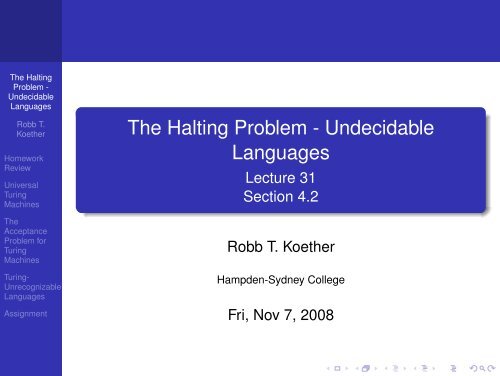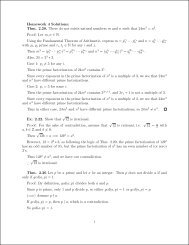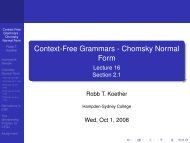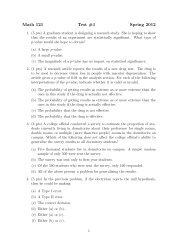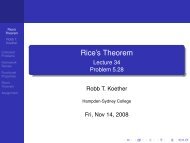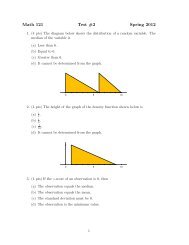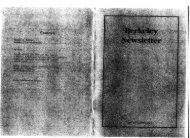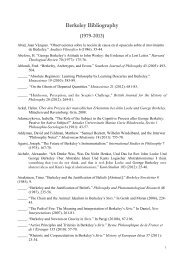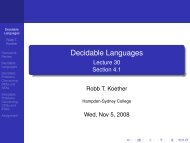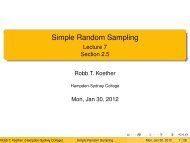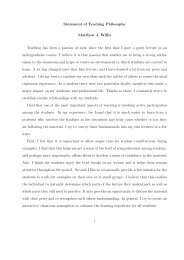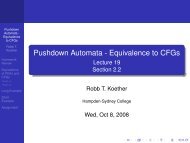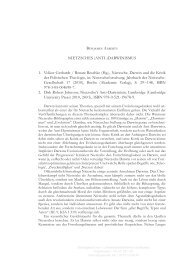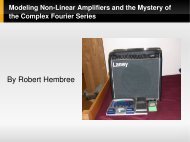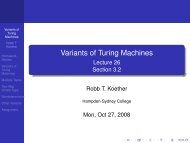Undecidable Languages - Hampden-Sydney College
Undecidable Languages - Hampden-Sydney College
Undecidable Languages - Hampden-Sydney College
You also want an ePaper? Increase the reach of your titles
YUMPU automatically turns print PDFs into web optimized ePapers that Google loves.
The Halting<br />
Problem -<br />
<strong>Undecidable</strong><br />
<strong>Languages</strong><br />
Robb T.<br />
Koether<br />
Homework<br />
Review<br />
Universal<br />
Turing<br />
Machines<br />
The<br />
Acceptance<br />
Problem for<br />
Turing<br />
Machines<br />
Turing-<br />
Unrecognizable<br />
<strong>Languages</strong><br />
Assignment<br />
The Halting Problem - <strong>Undecidable</strong><br />
<strong>Languages</strong><br />
Lecture 31<br />
Section 4.2<br />
Robb T. Koether<br />
<strong>Hampden</strong>-<strong>Sydney</strong> <strong>College</strong><br />
Fri, Nov 7, 2008
Outline<br />
The Halting<br />
Problem -<br />
<strong>Undecidable</strong><br />
<strong>Languages</strong><br />
Robb T.<br />
Koether<br />
1 Homework Review<br />
Homework<br />
Review<br />
Universal<br />
Turing<br />
Machines<br />
The<br />
Acceptance<br />
Problem for<br />
Turing<br />
Machines<br />
Turing-<br />
Unrecognizable<br />
<strong>Languages</strong><br />
Assignment<br />
2 Universal Turing Machines<br />
3 The Acceptance Problem for Turing Machines<br />
4 Turing-Unrecognizable <strong>Languages</strong><br />
5 Assignment
Homework Review<br />
The Halting<br />
Problem -<br />
<strong>Undecidable</strong><br />
<strong>Languages</strong><br />
Robb T.<br />
Koether<br />
Homework<br />
Review<br />
Universal<br />
Turing<br />
Machines<br />
The<br />
Acceptance<br />
Problem for<br />
Turing<br />
Machines<br />
Turing-<br />
Unrecognizable<br />
<strong>Languages</strong><br />
Exercise 4.10, page 183.<br />
Let<br />
INFINITE PDA = {〈M〉 | M is a PDA and L(M) is an<br />
infinite language}.<br />
Show that INFINITE PDA is decidable.<br />
Assignment
Homework Review<br />
The Halting<br />
Problem -<br />
<strong>Undecidable</strong><br />
<strong>Languages</strong><br />
Robb T.<br />
Koether<br />
Homework<br />
Review<br />
Universal<br />
Turing<br />
Machines<br />
The<br />
Acceptance<br />
Problem for<br />
Turing<br />
Machines<br />
Turing-<br />
Unrecognizable<br />
<strong>Languages</strong><br />
Solution<br />
Build a Turing machine that will do the following.<br />
Read 〈M〉 and create an equivalent context-free<br />
grammar G.<br />
Convert G to Chomsky Normal Form. Call it G ′ .<br />
Do a breadth-first search of the grammar rules of G ′<br />
looking for recursion.<br />
That is, does there exist a derivation A + =⇒ uAv<br />
If so, then accept 〈M〉.<br />
If not, then reject 〈M〉.<br />
Assignment
Universal Turing Machines<br />
The Halting<br />
Problem -<br />
<strong>Undecidable</strong><br />
<strong>Languages</strong><br />
Robb T.<br />
Koether<br />
Homework<br />
Review<br />
Universal<br />
Turing<br />
Machines<br />
The<br />
Acceptance<br />
Problem for<br />
Turing<br />
Machines<br />
Definition (Universal Turing machine)<br />
A universal Turing machine is a Turing machine that can<br />
read a description of any Turing machine and simulate it on<br />
any input.<br />
Do universal Turing machines really exist<br />
Turing-<br />
Unrecognizable<br />
<strong>Languages</strong><br />
Assignment
Universal Turing Machines<br />
The Halting<br />
Problem -<br />
<strong>Undecidable</strong><br />
<strong>Languages</strong><br />
Robb T.<br />
Koether<br />
Homework<br />
Review<br />
Universal<br />
Turing<br />
Machines<br />
The<br />
Acceptance<br />
Problem for<br />
Turing<br />
Machines<br />
Turing-<br />
Unrecognizable<br />
<strong>Languages</strong><br />
Yes. We call them programmable computers.<br />
They read a description of a Turing machine, which we<br />
call a program.<br />
Then they simulate the Turing machine, which we call<br />
executing the program.<br />
This should all sound familiar.<br />
Assignment
The Acceptance Problem for Turing Machines<br />
The Halting<br />
Problem -<br />
<strong>Undecidable</strong><br />
<strong>Languages</strong><br />
Robb T.<br />
Koether<br />
Homework<br />
Review<br />
Universal<br />
Turing<br />
Machines<br />
The<br />
Acceptance<br />
Problem for<br />
Turing<br />
Machines<br />
The Acceptance Problem for Turing Machines<br />
Given a Turing machine M and a string w, does M accept w<br />
The language is<br />
A TM = {〈M, w〉 | M accepts w}.<br />
Turing-<br />
Unrecognizable<br />
<strong>Languages</strong><br />
Assignment
ATM is Turing-Recognizable<br />
The Halting<br />
Problem -<br />
<strong>Undecidable</strong><br />
<strong>Languages</strong><br />
Robb T.<br />
Koether<br />
Theorem<br />
A TM is Turing-recognizable.<br />
Homework<br />
Review<br />
Universal<br />
Turing<br />
Machines<br />
The<br />
Acceptance<br />
Problem for<br />
Turing<br />
Machines<br />
Turing-<br />
Unrecognizable<br />
<strong>Languages</strong><br />
Assignment<br />
Proof.<br />
Build a universal Turing machine U and use it to<br />
simulate M on the input w.<br />
If M accepts w, then U will halt in its accept state.<br />
If M does not accept w, then U may halt in its reject<br />
state or it may loop.<br />
That is why U is only a recognizer, not a decider.
Turing-Unrecognizable <strong>Languages</strong><br />
The Halting<br />
Problem -<br />
<strong>Undecidable</strong><br />
<strong>Languages</strong><br />
Robb T.<br />
Koether<br />
Homework<br />
Review<br />
Universal<br />
Turing<br />
Machines<br />
The<br />
Acceptance<br />
Problem for<br />
Turing<br />
Machines<br />
Turing-<br />
Unrecognizable<br />
<strong>Languages</strong><br />
Assignment<br />
Theorem<br />
There exist Turing-unrecognizable languages.<br />
We will establish this by showing that the function<br />
f : M → L<br />
f : M ↦→ L(M)<br />
from the set M of all Turing machines to the set L of all<br />
languages is not onto.
Turing-Unrecognizable <strong>Languages</strong><br />
The Halting<br />
Problem -<br />
<strong>Undecidable</strong><br />
<strong>Languages</strong><br />
Robb T.<br />
Koether<br />
Homework<br />
Review<br />
Universal<br />
Turing<br />
Machines<br />
The<br />
Acceptance<br />
Problem for<br />
Turing<br />
Machines<br />
Lemma<br />
The set M of all Turing machines is a countably infinite set.<br />
Turing-<br />
Unrecognizable<br />
<strong>Languages</strong><br />
Assignment
Turing-Unrecognizable <strong>Languages</strong><br />
The Halting<br />
Problem -<br />
<strong>Undecidable</strong><br />
<strong>Languages</strong><br />
Robb T.<br />
Koether<br />
Homework<br />
Review<br />
Universal<br />
Turing<br />
Machines<br />
The<br />
Acceptance<br />
Problem for<br />
Turing<br />
Machines<br />
Turing-<br />
Unrecognizable<br />
<strong>Languages</strong><br />
Assignment<br />
Proof of the lemma.<br />
Each Turing machine has a finite description:<br />
(Q, Σ, Γ, δ, q 0 , q accept , q reject ).<br />
Express the description in binary, perhaps by using<br />
ASCII.<br />
Thus, the set of all Turing machines is represented by<br />
an infinite set of finite binary strings.<br />
We already know that every infinite set of finite binary<br />
strings is countable.<br />
(They can be arranged in lexicographical order.)
Turing-Unrecognizable <strong>Languages</strong><br />
The Halting<br />
Problem -<br />
<strong>Undecidable</strong><br />
<strong>Languages</strong><br />
Robb T.<br />
Koether<br />
Homework<br />
Review<br />
Universal<br />
Turing<br />
Machines<br />
The<br />
Acceptance<br />
Problem for<br />
Turing<br />
Machines<br />
Lemma<br />
The set B of all infinite binary strings is uncountable.<br />
To prove this, we need to use a diagonalization<br />
argument, which is based on proof by contradiction.<br />
Turing-<br />
Unrecognizable<br />
<strong>Languages</strong><br />
Assignment
Turing-Unrecognizable <strong>Languages</strong><br />
The Halting<br />
Problem -<br />
<strong>Undecidable</strong><br />
<strong>Languages</strong><br />
Robb T.<br />
Koether<br />
Homework<br />
Review<br />
Universal<br />
Turing<br />
Machines<br />
The<br />
Acceptance<br />
Problem for<br />
Turing<br />
Machines<br />
Proof of the lemma.<br />
Suppose B is countable.<br />
Then its members can be listed w 1 , w 2 , w 3 , . . ..<br />
Create a binary array that is infinite to the right and<br />
down by letting row i be the bits in w i , for i = 1, 2, 3, . . ..<br />
Turing-<br />
Unrecognizable<br />
<strong>Languages</strong><br />
Assignment
Turing-Unrecognizable <strong>Languages</strong><br />
The Halting<br />
Problem -<br />
<strong>Undecidable</strong><br />
<strong>Languages</strong><br />
Robb T.<br />
Koether<br />
Homework<br />
Review<br />
Universal<br />
Turing<br />
Machines<br />
The<br />
Acceptance<br />
Problem for<br />
Turing<br />
Machines<br />
Turing-<br />
Unrecognizable<br />
<strong>Languages</strong><br />
Assignment<br />
Proof of the lemma.<br />
For example, we might have<br />
w 1 = 0 1 1 0 0 1 1 1 . . .<br />
w 2 = 1 1 0 0 0 1 1 1 . . .<br />
w 3 = 1 1 0 1 0 0 0 0 . . .<br />
w 4 = 0 0 1 0 0 1 0 1 . . .<br />
w 5 = 0 1 0 1 0 1 1 0 . . .<br />
w 6 = 0 0 0 1 1 0 1 1 . . .<br />
w 7 = 1 0 0 1 0 0 1 0 . . .<br />
w 8 = 1 0 1 1 0 1 1 0 . . .<br />
.
Turing-Unrecognizable <strong>Languages</strong><br />
The Halting<br />
Problem -<br />
<strong>Undecidable</strong><br />
<strong>Languages</strong><br />
Robb T.<br />
Koether<br />
Homework<br />
Review<br />
Universal<br />
Turing<br />
Machines<br />
The<br />
Acceptance<br />
Problem for<br />
Turing<br />
Machines<br />
Proof of the lemma.<br />
Define an infinite binary string w as follows.<br />
If the i th bit in row i is 0, set the i th bit of w to 1.<br />
If the i th bit in row i is 1, set the i th bit of w to 0.<br />
Turing-<br />
Unrecognizable<br />
<strong>Languages</strong><br />
Assignment
Turing-Unrecognizable <strong>Languages</strong><br />
The Halting<br />
Problem -<br />
<strong>Undecidable</strong><br />
<strong>Languages</strong><br />
Robb T.<br />
Koether<br />
Homework<br />
Review<br />
Universal<br />
Turing<br />
Machines<br />
The<br />
Acceptance<br />
Problem for<br />
Turing<br />
Machines<br />
Turing-<br />
Unrecognizable<br />
<strong>Languages</strong><br />
Assignment<br />
Proof of the lemma.<br />
w 1 = 0 1 1 0 0 1 1 1 . . .<br />
w 2 = 1 1 0 0 0 1 1 1 . . .<br />
w 3 = 1 1 0 1 0 0 0 0 . . .<br />
w 4 = 0 0 1 0 0 1 0 1 . . .<br />
w 5 = 0 1 0 1 0 1 1 0 . . .<br />
w 6 = 0 0 0 1 1 0 1 1 . . .<br />
w 7 = 1 0 0 1 0 0 1 0 . . .<br />
w 8 = 1 0 1 1 0 1 1 0 . . .<br />
.<br />
So w = 10111101 . . .
Turing-Unrecognizable <strong>Languages</strong><br />
The Halting<br />
Problem -<br />
<strong>Undecidable</strong><br />
<strong>Languages</strong><br />
Robb T.<br />
Koether<br />
Homework<br />
Review<br />
Universal<br />
Turing<br />
Machines<br />
The<br />
Acceptance<br />
Problem for<br />
Turing<br />
Machines<br />
Proof of the lemma.<br />
Certainly, w is an infinite binary string.<br />
But w cannot be in the list of all infinite binary strings<br />
because it disagrees with every w i in the list.<br />
This is a contradiction.<br />
Therefore, B must be uncountable.<br />
Turing-<br />
Unrecognizable<br />
<strong>Languages</strong><br />
Assignment
Turing-Unrecognizable <strong>Languages</strong><br />
The Halting<br />
Problem -<br />
<strong>Undecidable</strong><br />
<strong>Languages</strong><br />
Robb T.<br />
Koether<br />
Homework<br />
Review<br />
Universal<br />
Turing<br />
Machines<br />
The<br />
Acceptance<br />
Problem for<br />
Turing<br />
Machines<br />
Turing-<br />
Unrecognizable<br />
<strong>Languages</strong><br />
Proof of the theorem.<br />
It is easy to see that there is a one-to-one<br />
correspondence between L and B.<br />
Define a function g : L → B as follows.<br />
For any language L, g maps L to the infinite binary<br />
string s defined by the following procedure.<br />
List of all the finite binary strings and order it<br />
lexicographically and number them w 1 , w 2 , w 3 , . . .<br />
Assignment
Turing-Unrecognizable <strong>Languages</strong><br />
The Halting<br />
Problem -<br />
<strong>Undecidable</strong><br />
<strong>Languages</strong><br />
Robb T.<br />
Koether<br />
Homework<br />
Review<br />
Universal<br />
Turing<br />
Machines<br />
The<br />
Acceptance<br />
Problem for<br />
Turing<br />
Machines<br />
Turing-<br />
Unrecognizable<br />
<strong>Languages</strong><br />
Proof of the theorem.<br />
For every i ≥ 1,<br />
If w i ∈ L, then the i th bit of s is 1.<br />
If w i /∈ L, then the i th bit of s is 0.<br />
Clearly, this is a one-to-one correspondence between<br />
the set of all languages and the set of all infinite binary<br />
strings.<br />
Thus, the set of all languages is uncountable.<br />
Assignment
Turing-Unrecognizable <strong>Languages</strong><br />
The Halting<br />
Problem -<br />
<strong>Undecidable</strong><br />
<strong>Languages</strong><br />
Robb T.<br />
Koether<br />
Homework<br />
Review<br />
Universal<br />
Turing<br />
Machines<br />
The<br />
Acceptance<br />
Problem for<br />
Turing<br />
Machines<br />
Turing-<br />
Unrecognizable<br />
<strong>Languages</strong><br />
Proof of the theorem.<br />
Now suppose that every language is recognizable.<br />
Then the function f : M → L defined by f : M ↦→ L(M)<br />
is onto.<br />
That implies that |M| ≥ |L|, which is impossible since<br />
M is countable and L is uncountable.<br />
Thus, there exist languages that are not<br />
Turing-recognizable.<br />
Assignment
Assignment<br />
The Halting<br />
Problem -<br />
<strong>Undecidable</strong><br />
<strong>Languages</strong><br />
Robb T.<br />
Koether<br />
Homework<br />
Review<br />
Universal<br />
Turing<br />
Machines<br />
The<br />
Acceptance<br />
Problem for<br />
Turing<br />
Machines<br />
Homework<br />
Read Section 4.2, pages 173 - 179.<br />
Exercises 5, 6, 7, page 183.<br />
Problems 15, 16, 19, 24, 25, 28, page 184.<br />
Turing-<br />
Unrecognizable<br />
<strong>Languages</strong><br />
Assignment


